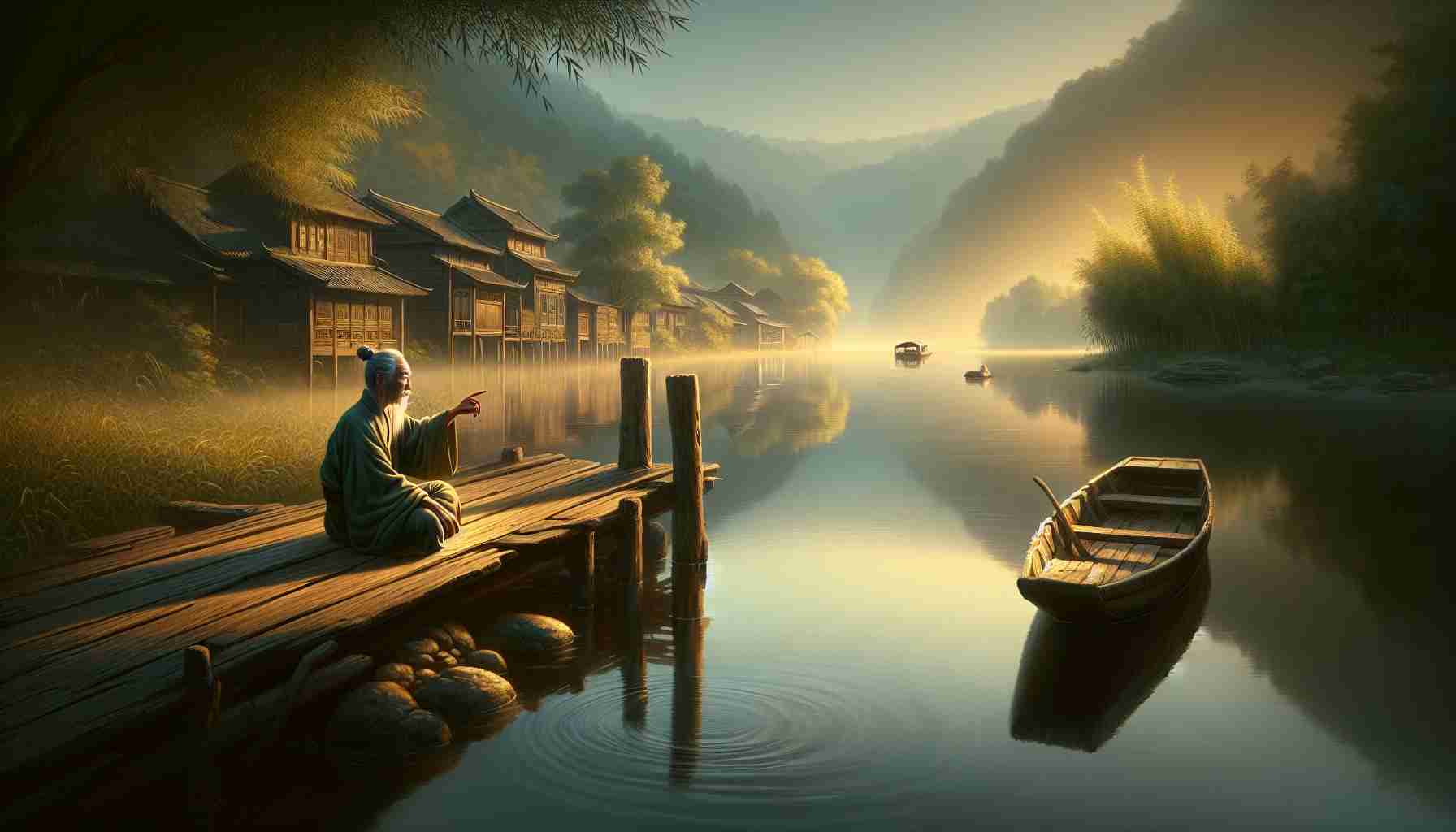

The river was wide and still that morning. I was just thirteen, but I felt like I was carrying something heavy inside me—a storm I couldn’t name. That’s why I went down to the shore before the sun was high, hoping the quiet would help settle my thoughts.
My name is Wei, and I lived in a village that sat beside the slow, winding river. It was the kind of place where time didn’t rush. Grandfather always said the river was like the Tao: flowing, gentle, and never forced.
That day, as I sat on an old wooden dock, I saw something strange—a boat floating toward me. It moved swiftly, yet there was no one inside. Just wooden planks bobbing gently with the water's rhythm.
“An empty boat,” I whispered.
But the man beside me—Master Chen, our village elder and storyteller—chuckled softly. I hadn't noticed he was there.
He nodded at the boat. “Do you know what the empty boat teaches?”
I shook my head. “It’s just a boat, with no one steering.”
Master Chen leaned closer and pointed to my heart. “Still, it carries a great lesson. Sometimes we are like boats. When we are full—of anger, pride, or worry—we hit others and stir waves. But when we’re empty, no one gets hurt, and the river flows smooth.”
I didn’t understand. I was full of questions—like why my friend Li had stopped talking to me, or why I felt so small whenever I couldn’t fix a problem.
He smiled kindly, as if he saw my confusion. “Long ago,” he began, “Master Zhuangzi shared a story. A man saw a boat crash into his own. If someone was inside, he would shout and get angry. But if the boat was empty, he wouldn’t get mad—it was just the river at work.”
“But it still crashed,” I said.
“Yes,” he nodded. “But the man’s peace stayed with him. You see, getting angry doesn't stop the boat. It only pushes the storm inside you.”
We sat in silence. The empty boat floated by us, slow and quiet, without harming a thing as it passed.
That evening, I sat beneath the bamboo trees and listened. The world wasn't rushing, even if I was. I thought about Master Chen’s words. Maybe I didn’t need to fill myself with worry all the time. Maybe being still was okay.
The next day, I saw Li near the riverbank. I felt the tightness in my chest but remembered the empty boat. I smiled and waved. He waved back. My heart felt lighter—not because I fixed anything, but because I didn’t force it.
I’ve thought of that boat many times. Each time I feel my storm rise, I picture its stillness.
I didn’t change overnight. But now, whenever I feel too full of anger or too eager to prove myself, I remember the calm waters and that quiet boat. And little by little, I try to be like it—empty, peaceful, and part of the natural flow.
The river was wide and still that morning. I was just thirteen, but I felt like I was carrying something heavy inside me—a storm I couldn’t name. That’s why I went down to the shore before the sun was high, hoping the quiet would help settle my thoughts.
My name is Wei, and I lived in a village that sat beside the slow, winding river. It was the kind of place where time didn’t rush. Grandfather always said the river was like the Tao: flowing, gentle, and never forced.
That day, as I sat on an old wooden dock, I saw something strange—a boat floating toward me. It moved swiftly, yet there was no one inside. Just wooden planks bobbing gently with the water's rhythm.
“An empty boat,” I whispered.
But the man beside me—Master Chen, our village elder and storyteller—chuckled softly. I hadn't noticed he was there.
He nodded at the boat. “Do you know what the empty boat teaches?”
I shook my head. “It’s just a boat, with no one steering.”
Master Chen leaned closer and pointed to my heart. “Still, it carries a great lesson. Sometimes we are like boats. When we are full—of anger, pride, or worry—we hit others and stir waves. But when we’re empty, no one gets hurt, and the river flows smooth.”
I didn’t understand. I was full of questions—like why my friend Li had stopped talking to me, or why I felt so small whenever I couldn’t fix a problem.
He smiled kindly, as if he saw my confusion. “Long ago,” he began, “Master Zhuangzi shared a story. A man saw a boat crash into his own. If someone was inside, he would shout and get angry. But if the boat was empty, he wouldn’t get mad—it was just the river at work.”
“But it still crashed,” I said.
“Yes,” he nodded. “But the man’s peace stayed with him. You see, getting angry doesn't stop the boat. It only pushes the storm inside you.”
We sat in silence. The empty boat floated by us, slow and quiet, without harming a thing as it passed.
That evening, I sat beneath the bamboo trees and listened. The world wasn't rushing, even if I was. I thought about Master Chen’s words. Maybe I didn’t need to fill myself with worry all the time. Maybe being still was okay.
The next day, I saw Li near the riverbank. I felt the tightness in my chest but remembered the empty boat. I smiled and waved. He waved back. My heart felt lighter—not because I fixed anything, but because I didn’t force it.
I’ve thought of that boat many times. Each time I feel my storm rise, I picture its stillness.
I didn’t change overnight. But now, whenever I feel too full of anger or too eager to prove myself, I remember the calm waters and that quiet boat. And little by little, I try to be like it—empty, peaceful, and part of the natural flow.